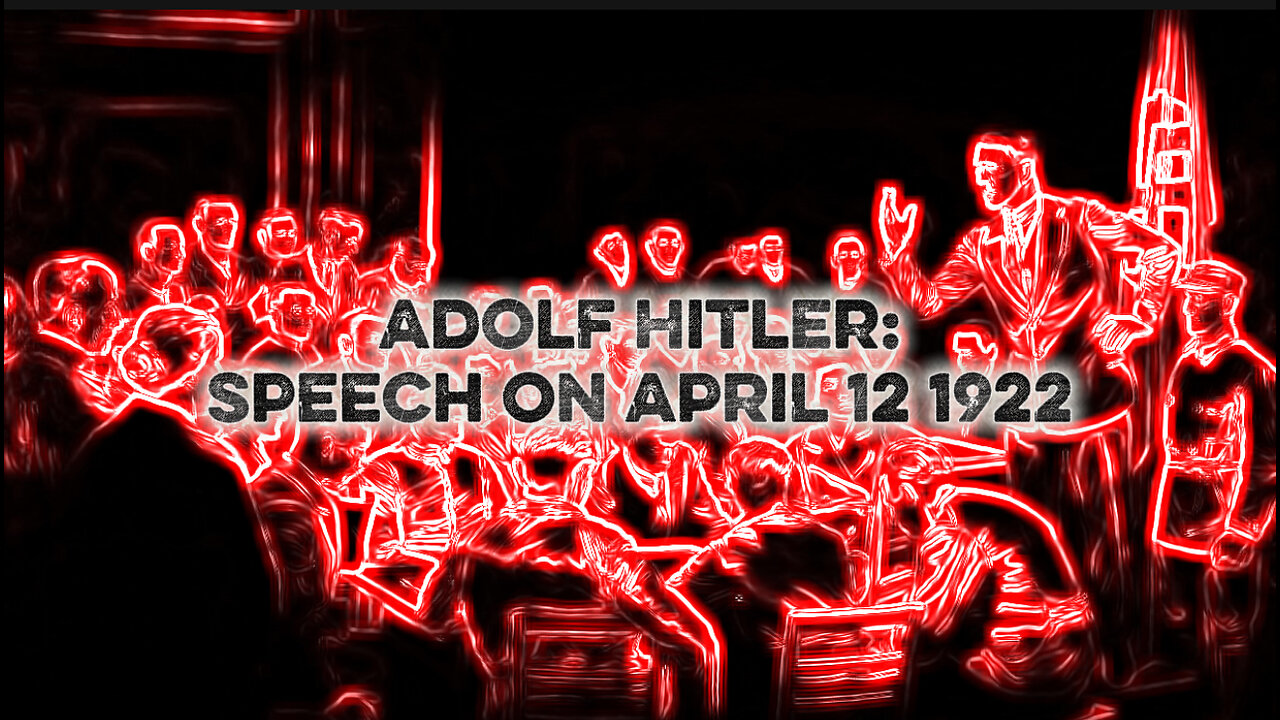Premium Only Content

Adolf Hitler Speech: April 12 1922
1. Economic Collapse & Reparations
Germany left with enormous war debt (7–8 billion marks) plus reparations.
Workers’ labor benefits foreign creditors, not Germany.
Reparations will keep Germany in perpetual debt, leading to loss of land and “enslavement of labor.”
November 1918 (end of WWI) marked not liberation, but the beginning of Germany’s collapse.
2. Loss of Sovereignty
Military prerogatives and financial independence lost after WWI.
Reparations Commission means Germany is no longer politically independent.
Germany reduced to a “colony of the outside world.”
3. Criticism of the Revolution & Democracy
Claims the Revolution brought no real social gains (eight-hour day, political rights, or freedom).
Treaties were imposed without genuine popular consent.
Freedom is superficial; people are afraid to speak openly.
Democracy depicted as “Jewish” and destructive to true Aryan leadership.
4. Attack on Capitalism & Jews
Banks and stock exchanges flourished after the collapse.
International Jewish finance accused of profiting from Germany’s misery.
Jews portrayed as parasitic, unproductive, and exploitative.
Soviet Russia depicted as controlled by Jews who live in luxury while millions starve.
The “Jewish danger” presented as the root cause of both capitalism and Bolshevism.
5. Criticism of Left & Right Politics
The Left: accused of leading toward Bolshevism, keeping workers divided, and using lies to maintain power.
The Right: accused of being weak, short-sighted, and too focused on petty politics or monarchism.
Both sides fail to recognize the real racial and national struggle.
6. National Socialism as the Solution
Hitler outlines seven principles as the foundation of the movement:
National + Social are identical (nationalism and socialism combined).
No class division among Germans – only one people united by blood.
Race-based worldview – Aryans value work for community, Jews exploit others.
Economic prosperity requires political freedom – reject internationalism.
Fanatical nationalism – state must be controlled by Germans for Germans.
Power depends on will, not numbers – minorities with energy can shape history.
Truth must be acted upon – willpower is essential for change.
7. Appeal to Religion
Hitler portrays Jesus as a fighter against Jews, not as a passive sufferer.
Claims Christian duty requires opposing Jewish influence.
Pity for German workers tied to Christian morality.
8. Call for Resistance & New Faith
Movement began by denouncing the Treaty of Versailles as criminal.
Hitler positions himself as an early “agitator” warning of dangers (loss of Silesia, occupation of Ruhr, reparations, Jewish influence).
Claims German people need a new faith, a clear goal, and a unifying belief system.
Presents National Socialism as that faith, promising strength, unity, and salvation for Germany.
-
 1:08
1:08
From Zero → Viral with AI
16 hours ago $0.60 earnedAI Influencers are coming....
4.65K1 -
 LIVE
LIVE
The Bubba Army
2 days agoMTG TURNS ON TRUMP! Explosive 60 Mins Interview - Bubba the Love Sponge® Show | 12/08/25
1,575 watching -
 13:09
13:09
Forrest Galante
11 hours agoI Went Bowfishing For America's Most Invasive Fish
132K2 -
 11:42
11:42
MattMorseTV
16 hours ago $21.98 earnedShe ADMITTED to ALL OF IT.
33.8K179 -
 10:58
10:58
MetatronHistory
1 day agoMedieval Dungeons VS Fantasy Dungeons
29K4 -
 1:44:46
1:44:46
PandaSub2000
1 day agoUltimate Chicken Horse | ULTRA BEST AT GAMES (HD Edited Replay)
53.6K1 -
 16:25
16:25
GritsGG
16 hours agoWe Were Not Supposed to Regain BUT WE DID! Insane Warzone Victory!
22.8K -
 1:11:16
1:11:16
omarelattar
5 days agoHow I Went From Depressed w/ $0 To $500 Million Per Year In My 20's (COMFRT CEO Hudson Leogrande)
33.3K2 -
 24:45
24:45
Blabbering Collector
2 days agoUnboxing The 2025 Diagon Alley Advent Calendar By Carat Shop | Harry Potter
46.9K6 -
 LIVE
LIVE
Lofi Girl
3 years agolofi hip hop radio 📚 - beats to relax/study to
339 watching